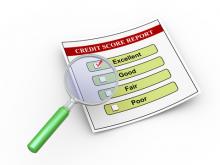 Every loan or debt should be marked as either discharged in bankruptcy, or included in bankruptcy.
Every loan or debt should be marked as either discharged in bankruptcy, or included in bankruptcy.
This is true even if you are continuing to pay the loan after the bankruptcy is done, or if you are in a Chapter 13 bankruptcy.
Credit reports are an amazing tool to allow lenders to see a person’s financial situation at a glance, and make quick decisions about making loans.
But they can only do this if they are accurate.
Unfortunately, many credit reports are inaccurate.
How many credit reports have errors?
- A Federal Reserve study surveyed other research, and found that 1 in 3 American credit reports have errors (Source, Federal Reserve)
These errors can make it difficult to borrow money in the future, and work to deny you the fresh start that comes from filing bankruptcy.
How do lenders and credit reporting agencies resolve errors?
Unfortunately, lenders and credit reporting agencies do not spend very much time trying to correct any errors.
- Instead, they rely on you the consumer to find and correct any errors on the credit reports
Since bankruptcy involves so many entries, and so many companies, it is likely that some of them will make errors when they report the bankruptcy to the credit bureaus.
HOW DO I GET A CREDIT REPORT?
A few months after filing for bankruptcy it is a good idea to request a free credit report from each of the three credit bureaus:
You won’t have to pay for these credit reports if you go to www.annualcreditreport.com.
This is a website set up by the Federal Trade Commission, and it allows everyone to get one free copy of each of their credit reports once per year.
Choose the option that doesn’t tell you the credit score otherwise they will charge you for the score.
We don’t care about the score right now because it will be low anyhow.
The purpose of doing this is to lay the foundation for your credit score to increase quickly.
WHAT SHOULD I LOOK FOR?
Remember that when you file bankruptcy, you must list all of your debts.
This means that every open credit account in existence at the time of filing should be marked as either included in bankruptcy, or as discharged in bankruptcy.
- Any account that you paid off prior to the bankruptcy should be listed as paid and closed
Without the bankruptcy, all of the delinquent and collections accounts would report to the bureaus every month that you had missed a payment.
This lowers your credit score every month.
Why does bankruptcy improve credit score?
- After your bankruptcy, however, the discharged debts will not get a new delinquency listing every month
This is why bankruptcy often IMPROVES your credit after a few years.
The amount of each debt should be at $0, and the month-to-month breakdown of these debts should not show overdue payments after the bankruptcy is filed.
When you review your credit reports you want to be looking to see if any of the debts we included in the bankruptcy are still reporting delinquencies or missed payments.
What should you do if you find delinquencies or missed payments?
- You should dispute them right away
- Most loans will stay on the credit report for 7 years from the last activity (and a missed payment counts as activity)
Since bankruptcy stops any further activity on these loans, it starts the clock running on when the bad things will be removed from your credit report.
- The sooner you file a bankruptcy case, the closer you will be to having a pristine credit report
If you let things languish in collections and in default, that only increases the number of years that they will remain on your credit report.
The issue of what happens with debts that survive bankruptcy is a little more complicated.
Conclusion
If you’re worried about your credit report, or want to know if Chapter 7 Bankruptcy or Chapter 13 Bankruptcy is right for you, why not call us at 612.824.4357 now, and tell us how we can help you?
Photo Credit: © Ribah2012 | Dreamstime.com

